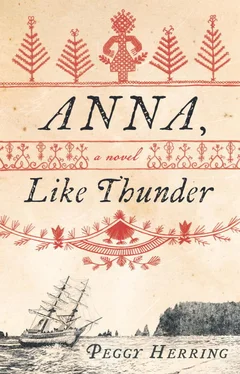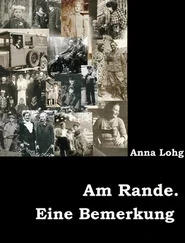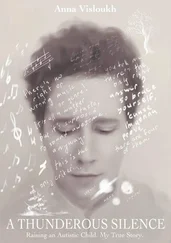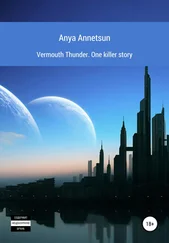“That’s what I like to hear. Remain alert. Both of you.”
They give assent, and then Nikolai Isaakovich drops his voice. “As for you, my darling, it’s time to come inside.”
“In a moment,” I say, raising the telescope again.
“In a moment. In a moment,” he says and sighs, but there’s humour in his voice. “You think we’re sailing for your amusement? That the chief manager doesn’t have more important work for us?”
The colony’s chief manager, Alexander Andreyevich Baranov, has given my husband a special commission. Nikolai Isaakovich has been put in command of a crew of twenty and tasked with sailing south to further refine our empire’s knowledge. He’s to explore and chart the coast, and to look for a secure harbour where settlement might be established to facilitate the company’s trade for sea otter pelts. He’s to fill the hold with furs along the way. The Sviatoi Nikolai , this brig, is under his sole command for a few weeks of the expedition, after which we’ll meet another Russian ship, the Kad’iak , at a predetermined location, to continue the mission together, as though we’re not merely two ships but a great imperial fleet.
My husband has hung a wooden plaque carved with the Imperial Decree in our quarters. I see it every morning as soon as I wake up, and by now I’ve memorized it. It instructs us “to use and profit by everything which has been or shall be discovered in these localities, on the surface and in the bosom of the earth without any competition by others.” It’s well known in Petersburg that Tsar Alexander is obsessed with Russian America and that, if it weren’t for Napoleon’s aggressions in Europe, he’d sail the coast himself.
The cloud cover thickens, obscuring my Polaris. She tries valiantly to twinkle through the grey, but it’s no use. I’ll have to wait yet another night. I take her cue and follow my husband to our quarters.
The wind and sea are muffled down here, yet the thud of the waves that strike the hull and the answering grind of the timbers are still disquieting. The ship’s dog, Zhuchka, whines and cowers on a mat next to the bed. She’s on board to work—she’s our sentinel when we go ashore, alerting us to danger, assisting the promyshlenniki in the hunt for game. But even when the seas are only a little rough, she’s a coward, and she’s become the source of much mockery among the crew if she happens to be on deck at such times.
“Don’t worry, Zhuchka—it’s just a little wind.” I sit on the bed and pull her head onto my lap. She buries her nose into the damp folds of my shawl. Her russet-coloured tail, tipped in white like a paintbrush, thumps the floor. It has the most endearing curl, like the hair at the nape of a baby’s neck.
“Would you leave that dog alone? You treat it like it’s your child,” my husband says.
“Are you becoming jealous?” I say lightly and kiss the dog’s forehead with a big smack.
“Stop!” my husband cries. He leaps across the room and pries the dog from my embrace, pushing her out the door and slamming it behind her. The walls shake. He throws himself on the bed beside me and makes a big show of wiping my lips clean with his fingers. “Watch who you’re giving your kisses to,” he murmurs, and then he presses his lips to mine.
I pout and push against his chest. “I’m eighteen years old and can choose whoever I want to kiss.” I lie back to get away.
But that’s just part of our game. Nikolai Isaakovich flings himself down beside me and kisses me again. He slides his lips to my throat. I arch my neck to accept him.
He strokes my hair, my cheek. His slips one hand underneath my shawl and onto my bosom. He whispers, “Annichka.” With his other hand, he clutches my wrist and pulls my hand to his chest.
For a short time and a long time, we continue, my arm around his back, his leg bent around mine, my mouth open to his shoulder, his mouth closed on my fingers. Something bony presses against my thigh. For an instant, I think it’s my telescope. But no. I set that on the table. I suppress a smile.
He opens his trousers and pulls up my skirt.
He pushes himself inside me. His eyes close, and his face transforms. He thrusts and pants.
When I pull his hips to mine and thrust back, I feel his touch deep inside. It’s a place I can’t name. I think it’s near where dreams take shape. It’s a place created by romantic thoughts, and nurtured into bloom by the glances and brief meeting of fingers I’ve seen my parents exchange, seen men and women in Petersburg share while dancing.
Finally, sounds form deep inside him, as though some great beast is coming to life. He grunts and grunts and calls out: to me, to God, and to his mother. Then, he collapses atop me, sweaty and gasping, a lock of his hair between my lips.
After he rolls off, and his liquids dribble out, I can think of nothing except facing the old Aleut, Maria, in the morning. Thankfully, our quarters are far from the smelly forecastle where the promyshlenniki hang their hammocks. But we share a thin wall with Maria. She prepares the meals and washes clothing for me and Nikolai Isaakovich, and, since it would be impossible to house her with the men, she occupies a berth next to our cabin. The light from her lamp shines some evenings through the knots and cracks in the planks that separate us. If one were disrespectfully inclined, one could peer through these holes into the next room. I confess that I know how easy this coarse act would be because I did it. Maria wasn’t there at the time. I could see clearly her bunk, a padlocked trunk, and a length of rope that ran from one corner of the room to another, though nothing was hanging from it.
Does Maria have such ill manners? It’s possible, but it makes no difference, for what she can’t see, she most certainly can hear. She could keep her own log book to mark the exact dimension and frequency of our passion, though why she’d care, I don’t know.
When I wake in the morning, it’s to near silence. I’m alone. The wind has died. In our dim quarters, I mull that over—how we say the wind has died as though it’s a living creature. If it were a living creature, what would it look like? What would it say?
The peasants believe in such things. The spirits dwell everywhere in their world and guide them through their lives. The domovoi lurks beneath the kitchen hearth. The leshii, disguised as a mushroom, tickles careless woodsmen to death in the forest. The long-haired rusalki lure young men to their watery graves in murky ponds. And the vodyanoy, who lives deep in the whirlpools of the sea, kicks up storms and sinks little boats and big ships alike.
“The Enlightenment hasn’t reached them yet,” my father says. “The Tsar is right when he says as long as they can’t understand science, they’ll continue to lead deprived lives.” Sometimes when he blusters against superstition, my mother leaves the room.
“What did I say wrong?” my father calls.
It’s easy for him. He has his tables and logs. Three telescopes set up in a turret. He’s invited to address the Imperial Academy of Sciences several times a year. When he was a boy, he went to the home of the celebrated astronomer Monsieur Mikhail Lomonosov just after his great discovery of the gases that swirl around Venus. “Everything in the world is rational, Anya,” he tells me. “And if you think it’s not rational, it only means you haven’t thought hard and long enough about it yet.”
I’m enlightened, too. I know that science governs the earth, the planets, the stars—everything. But does he never wonder? Has nothing ever happened to shake his faith in science? How is he so certain that everything can be measured and logged? I wish I were as steadfast, but it’s too late. The doubts seeded themselves long ago, and after that, nothing he said or did could have stopped them from taking root and showing themselves at the least opportune moments.
Читать дальше













